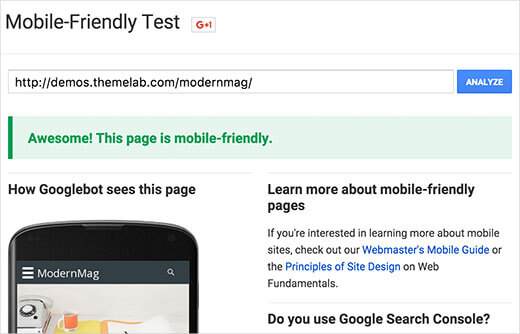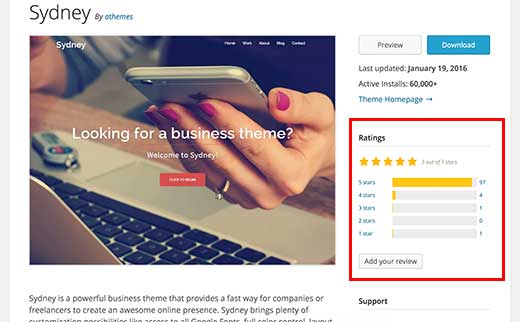For Select The Perfect WordPress Theme – 9 Things You Should Consider
- September 7, 2016
- Posted by: Sadman Sakib
- Category: Beginners Guide

Most beginners feel overwhelmed when it comes to selecting a theme for their WordPress site. There are thousands of free and paid options. Each theme looks better than the other. How do you choose the best theme for WordPress? In this article, we will share the 9 things you should consider, so you can choose the best WordPress theme for your site.
Why You Should be Careful When Choosing a WordPress Theme?
WordPress is used to create all kind of websites. That’s why each theme caters to a different market.
Your WordPress theme should complement the content of your website. For example, if you are creating a blog on politics or social issues, then you would want a theme that improves readability.
 Many WordPress themes come with tons of customization options. If not coded properly, these options can make it difficult for you to change themes or use other WordPress plugins. You will be locked into that theme or will have to pay a developer to help you switch.
Many WordPress themes come with tons of customization options. If not coded properly, these options can make it difficult for you to change themes or use other WordPress plugins. You will be locked into that theme or will have to pay a developer to help you switch.
On the other hand, some WordPress themes that look really great can actually make your website incredibly slow. No one likes slow websites, particularly Google, which prefers to rank faster websites higher.
Your theme is the face of your WordPress site and plays an important role in how users as well as search engines perceive it.
You’ve probably heard the saying, ‘All that glitters is not gold’.
Having said that, let’s take a look at the steps you can take to make sure that you select the best theme for your WordPress site.
1. Strive for Simplicity
Simplicity is the best rule in design
Many WordPress themes come with lots of colors, complex layouts, flashy animations, etc. Sometimes you may need those things, but in most cases you don’t really need all that.
Look for a theme that has a design layout that helps you support your goal. It needs to look good but without compromising on usability and simplicity.
Make sure that the theme’s presentation style is not overly complicated. The purpose of web design is to help users find information they need and to help site owners achieve their goals at the same time.
If a theme looks great but does not help you get new business or subscribers, then it is not a good theme. It is also not a good theme when your users can’t really find their way around your website.
2. Responsive is Not Optional Anymore
Choose a Responsive WordPress Theme
Responsive themes adjust their layout across different screen sizes and devices.
A significant number of web traffic is generated from mobile and other handheld devices. Depending on your website’s topics, this number could go even higher than 50% of your traffic.
Google shows mobile friendly websites on top in their mobile search results. Regardless of your site’s topics and demographics, all websites need to be responsive and fully mobile ready.
Most WordPress themes are already responsive by default. But there are still sellers who are selling fixed width layouts that are not mobile friendly at all. Make sure that the theme you are choosing for your website is mobile friendly.
Testing a Theme for Mobile Readiness
The easiest way to test whether a theme is responsive or not is by resizing your browser screen. As you resize your browser screen, you will notice that the theme’s layout will adjust itself to the screen width.
For more thorough testing you can copy the URL of theme’s demo page and paste it in Google’s Mobile Friendly Test page.
 Please note that this test will show some warnings, regardless of how good a theme is. Lookout for any red flags like text too small, content wider than screen, etc.
Please note that this test will show some warnings, regardless of how good a theme is. Lookout for any red flags like text too small, content wider than screen, etc.
3. Browser Compatibility

Your users will be using different browsers. Your theme may look perfect on the browser you use, but there might be something broken in other browsers.
This is where browser compatibility comes in. Most WordPress theme developers test their themes rigorously by using sophisticated browser compatibility testing tools.
They may clearly mention this on their website. But if they don’t, then you can always run some basic tests to check the theme on different browsers like Google Chrome, Firefox, Internet Explorer, Safari, etc.
Don’t forget to test on different browsers on mobile as well.
4. Supported Plugins
The real power of WordPress comes with WordPress plugins. These plugins make it possible for you to do anything with your WordPress site.
While there are plenty of WordPress plugins, some are must-have WordPress plugins for every websites. Like Gravity Forms, Yoast SEO, W3 Total Cache, etc.
Make sure that your WordPress theme supports all popular plugins. If you are unsure, ask theme developer about it.
5. Translation + Multilingual Ready
A large number of WordPress sites are not in the English language. You may be creating a website in a language other than English. Maybe you have plans to create a multilingual WordPress site in the future.
Make sure that your WordPress theme is translation ready and supports multilingual WordPress plugins.
6. Page Builders
Drag and drop page builders for WordPress themes
Page builders are WordPress plugins that allow you to create page layouts using drag and drop user interface.
Many premium WordPress themes come with page builders pre-installed. Some of these page builders are used by that theme developer only.
Using such a page builder to create landing pages can produce a lot of unwanted code. If you ever switch the theme, then those pages will require a lot of cleaning up.
You should choose themes that are shipping with one of the most used page builder plugins. You can also purchase these page-builders separately to use with other themes as well.
7. Support Options for When You Need Help
One downside of using a free WordPress theme is that there is no guaranteed support. While some developers provide excellent support for their free themes, many free themes have no support option.
If you mess up your WordPress theme, then you will have to figure it out on your own. You can also end up paying a third-party developer to solve the tiniest problems.
Make sure that you select a WordPress theme that has good documentation and support option. Most premium WordPress themes offer detailed documentation with 1 year of email based support.
8. SEO Friendliness
Check your theme for SEO friendliness
Your WordPress theme plays a crucial role in your site’s SEO friendliness. A good looking theme can still generate poorly coded HTML, this could affect your site’s performance on search engines.
It could be difficult for beginners to analyze a theme’s source code on their own. This is why many premium WordPress theme developers will let you know that their pages are optimized for SEO.
You can also take a look to see if the page generates proper HTML5 by checking it with W3C Markup Validation service. However, please note that the W3C tool will generate many warnings which are nothing to be worried about.
9. Ratings and Reviews
Check ratings and reviews for a WordPress theme
Another solid indicator of a WordPress theme’s quality is ratings and reviews provided by their users. If the theme is sold on a third-party marketplace, then you will see customer reviews.
For free WordPress themes, you will find the ratings section just below the download button. It will show the number of reviews and stars given by users. If you click on 5 stars, then it will show you all the reviews that gave the theme 5 stars.

We hope this article helped you select the perfect theme for your WordPress site.



